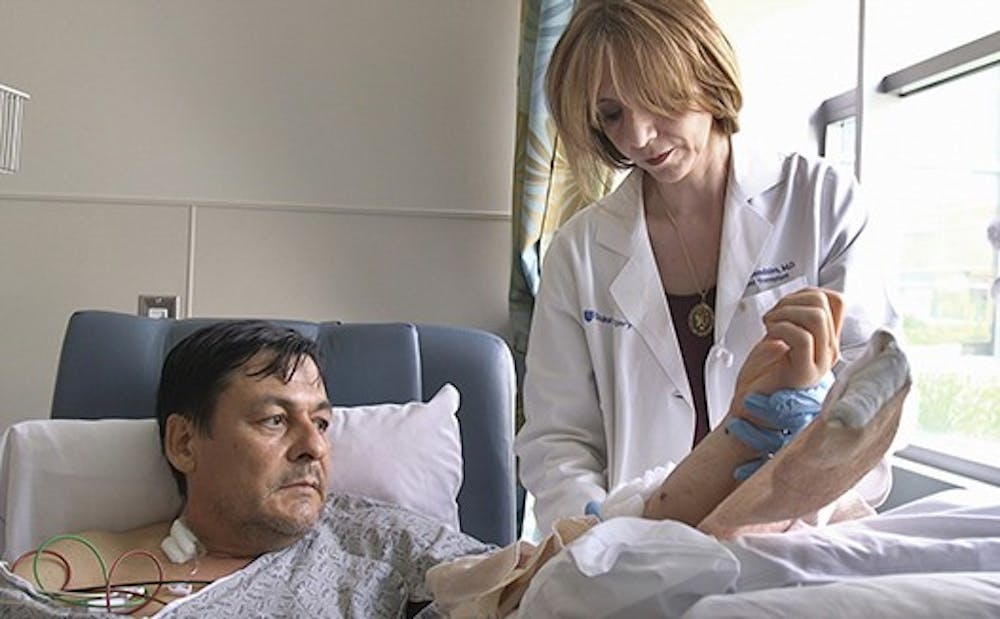The patient who received the first hand transplant in North Carolina history at Duke University Hospital in May is recovering successfully.
A team led by Dr. Linda Cendales, associate professor of surgery at Duke University School of Medicine and director of the hand transplant program, performed the surgery on 54-year-old Rene Chavez, who lost his left hand in a childhood accident at age four. During the 12-hour operation, the skin of the patient’s residual limb was opened, and tendons, muscles, nerves, arteries, veins and bones from both the patient and the donor limb were dissected and their ends connected. Jodi Moore, a certified hand therapist working with Chavez, said that he has been doing very well since the surgery May 27.
"[The success has been] huge," she said. "He was the perfect candidate for Duke's first [hand transplant]."
Hand transplantation is a type of vascularized composite allotransplantation therapy, which transplants tissues such as skin, bone and muscle to reconstruct defects that one's own tissue cannot repair.
The hand transplant program at Duke is partially funded through a partnership with the Department of Defense, as part of a greater effort to treat war injuries such as limb amputation.
For the first three months after the procedure, Chavez is required to stay in Durham for the team to follow up on his conditions.
“Mr. Chavez’s recovery is going as planned," Cendales said. "He continues to do well, and we have not experienced any unexpected events so far.”
Cendales said that the team is following a protocol approved by the Institutional Review Board at Duke that spans from the initial visit to the follow-up appointments afterward.
"[The hand] impacts the patient’s life in ways that he is still discovering," she said.
The transplant program includes a range of medical, psychosocial, immunological, neurological and surgical components to help Chavez adapt to his new hand. Cendales said that there is a risk Chavez will experience complications.
"Similar to any other organ, [rejection] is an anticipated immunological response of the body," she said. "Rejection happens in essentially all transplant recipients, and there is no reason to believe that a hand transplant is any different."
However, Cendales noted that the team has a standard protocol in place should rejection occur.
The follow-up work performed by the team includes laboratory work and radiology as well as monitoring Chavez's immunosuppression medication and his progress with occupational therapy.
Moore has worked with Chavez in occupational therapy for about four hours a day, up to six days a week. The therapy entails exercises to strengthen his entire upper extremity and expand his range of motion, she said. She noted that Chavez has been extremely compliant, which has contributed to his smooth recovery.
“He has gained the ability to use his hand to eat and drink, and he has started writing, lifting items, not very heavy items, but he can lift with that hand," she said. "We have practiced throwing a ball—he has a six-year-old grandson that he is looking forward to going back to Texas to see, and that was one of the things he wanted to do."
The study of Chavez's hand transplant will take 18 months, at which point he will undergo a thorough evaluation. Even after that period, he will continue to follow up with the medical team at least annually.
Cendales explained that there are plans in place for four more transplants to be completed through funding by the Department of Defense. The Duke program has had a significant role not only in the field of hand transplantation but also in the field of vascularized composite allotransplantation therapy, she noted.
"We have a comprehensive program studying VCA, and it includes research from the bench to the bedside," she said. "We currently also lead the international society for the field, so our systematic and comprehensive approach to the field and our service are components of the development of VCA."
Get The Chronicle straight to your inbox
Signup for our weekly newsletter. Cancel at any time.

